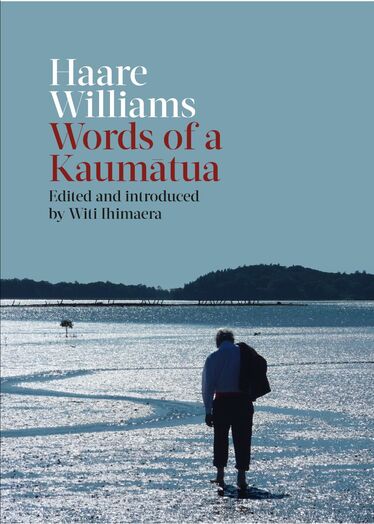
by Haare Williams,
Witi Ihimaera (ed)
Tēna koe mō tēnei taonga Haare. Ka nui te pai tāu whakaaro pūkōrero, tāu mōhiotanga hōhonu, tāu whakaute mō te tikanga Māori.
I have always enjoyed the literary excursions of Haare Williams. I have in front of me, for example, Pacific Moana Quarterly of April 1978, in which there are two fine poems by him, namely Totara Tree with its dedication to the interconnectivity of land and life; and Taupo-Nui-a-Tia, with its depiction of co-operative joy overcoming all exigencies.
So, reading this new, rather thick (260 pages, sectioned into four interrelated compartments) compilation of the thoughts of this respected Māori elder – as expressed in both prose and poetry and as shared between two reo – makes my heart feel warm. Because the self-same themes continue to flow unabated.
Here is a humble man who is never reluctant to pointedly address the historic and continued contemporaneous plight of ngā iwi Māori katoa, but is always at the same time, often within the same piece, enunciating so assuredly the force of wairua running through all living entities. Indeed, these two apparently polar aspects are in fact all part of a wider and holistic Māori metaphysic, which is ingrained in Williams’ very being, moulded as it was by his upbringing, his tipuna, his ‘Grans.’ As Witi Ihimaera so cogently puts it on the back cover, ‘we are privileged to obtain the wisdom of a Māori elder of the old school.’ Tika tēnei kōrero.
Trampling on indigenous land rights by ignoring the precepts of Waitangi, for example, was tantamount to killing what surrounds us all: ngā manu, ngā ika, ngā kararehe, ngā ngarehe – all life, including ourselves. Inauthenticity breeds breakdown of our existential balance. Williams does concede that the situation for Māori is improving steadily, but stresses that there remains a long route ahead for everyone in this country. He notes sagely,
‘Māori have since then peacefully remonstrated against the looting of a heritage by invaders who feigned piety and righteousness over a giving people who had an intrinsic generosity of spirit and who once controlled their lands and resources. After many, many years, that’s now beginning to change – not quantum leaps forward – but there have been incremental gains in the evolution of the nation towards maturity and securing a peaceful future’ (from What is Māori Education or Mātauranga Māori? p. 199.)
He writes well. His many and varied prose pieces remain cogent and concise, as in the abovementioned example. His poetry, in both tongues and as sometimes conveyed via shape/concrete verse, is full of vibrant and visceral imagery, as well as wit and expressions of wonder at the gift of Nature, of reverence for Creation. As combined succinctly here –
Our nation was born
in the bosom of the ocean
where the sea leans
on the land
(from Ngā Waiata o Tangaroa, p. 46.)
As I noted in my introduction: this book is a treasure, a warm stream that flows prolifically; a mystic current to plunge into at any bend. Refreshing and rewarding; resilient and real.
As here -
‘Isn’t it time we pensioned off the old celebrations that came from another hemisphere to Aotearoa and celebrate instead something like Matariki which is closer and more accessible to us all?’
(from The Seven Stars of Matariki p. 241.)
Whakarongo ki te manu kōpara? (Listen to the kōpara bird.)
Indeed.
Author: Haare Williams; Witi Ihimaera (ed)
Publisher: Auckland University Press
ISBN: 9781869409043
RRP: $49.99
Available: bookshops

 RSS Feed
RSS Feed
